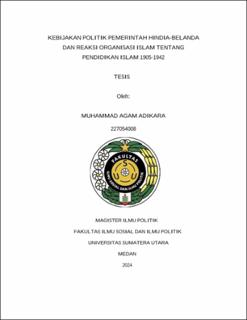| dc.description.abstract | The most important policy among the products of political policy of the
Netherlands East Indies government is its policy on educational politics.
Educational politics is not only a part of colonial politics but also the core of
political politics. Education in the era of Dutch colonialism was one of the Dutch
ways to maintain their colonialism in their colonies. The policy which had been
established by the Netherlands East Indies government was ordnance policy of
Teachers and Uncivilized schools. This ordinance policy was the policy made by
the Netherlands East Indies government; it is aimed to limit education for
indigenous people. However, this policy was challenged by the indigenous
intellectuals, including the Islamic intellectuals since it harmed the natives. This
condition triggered reaction from the Islamic organizations which opposed and
asked Netherlands East Indies government for revoking the ordinance policy on
Teachers and Uncivilized Schools.
This research uses qualitative research method. Its type is descriptive
qualitative in which the researcher describes the data as the result of a research.
The data are collected by using triangulation method, the combination of the
source of data, the researcher, and theories and conducting library research and
documentation. This research also uses the theory public policy proposed by
William Jenkins in order to find a decision which has been made by a certain
government is interrelated to each other and whether they have the intention to
reach a success in a policy which has been made by possessing an authority
which has certain limitation. A public policy includes organizing an agenda,
formulation of a policy, and policy adoption.
The result of the research shows that the policies on education of the
Netherlands East Indies government is not intended to improve the Indonesian
people 's way of thinking; the education is only intended to give an opportunity to
indigenous elites who are thought to preserve the Dutch power in Indonesia. This
policy on education was made because the Dutch colonial was worried about the
advancement of education in its colonies, especially in the Netherlands East
Indies. The effect of the implementation of this ordinance policy was because the
Dutch colonial was afraid if the educational organizations joined together in
opposing the Netherlands East Indies government.
It is recommended that Education in Indonesia attempt to get equality in
education in which it used to apply class grading according to students ' ages.
Meanwhile, the Islamic schools applied educational system under the 'kiayi'
(Muslim religious scholar), the Netherlands East Indies government got
challenges from various organizations, either the national organizations or the
Islamic organizations. They disagreed with the ordinance policy on Teachers and
Uncivilized Schools which limited room to maneuver for educated people in
instilling nationalism in young generation and this policy restricted for Muslims
and halted the Islamic development because Islam was regarded as the inhibiting
factor for the Dutch colonial to accomplish their missionary. | en_US |


